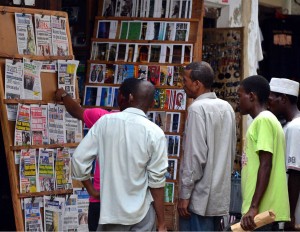by David Brewin
On 9 October the Government placed a 14-day ban on publication of the popular Swahili newspaper Mwananchi and a 90-day ban on Mtanzania. They were alleged to have published classified information and “seditious articles likely to provoke incitement and hostility with the intention of influencing the public to lose confidence in state organs and create disharmony”. The government referred specifically to two articles in Mtanzania, headlined ‘Presidency through Bloodshed’ and ‘Revolution is Inevitable’, and to the publication of a confidential document on government salary structures in Mwananchi.
As Tanzania is widely regarded as having a relatively free press compared with other countries in the region, there was immediately a huge outcry.
The executive secretary of the Media Council of Tanzania (MCT), Kajubi Mukajanga, said: “The steps taken by the government are very unfortunate and undemocratic and have taken the country decades back in its endeavour to build a democratic society which respects freedom of expression …… an assault on the press is an assault on democracy.” He advised the government to pursue other avenues to redress what it perceives as misrepresentation by the press including dialogue, feedback and the use of the mediation services of the MCT.
Among others expressing strong disapproval were the European Union, US Ambassador Leonhardt and a coalition of 50 human rights organisations. The Uganda Monitor said ‘governments should at all times show that they have nothing to hide’, while the Legal and Human Rights Centre and media stakeholders declared a media blackout on the Minister of Information and on the Director of Information Services.
In November, the government asked parliament to amend sixteen laws including one to increase the fine for publishing false statements from
TSh 150,000 to TSh 5 million. Parliament rejected this amendment, calling instead for a new bill to replace the 1976 Newspaper Act. Meanwhile, in Britain, wrangling continues between the government and the media over proposed press controls. The media would prefer to control itself but the government is insisting on some element of control by the government to curb excesses by the more popular papers.

